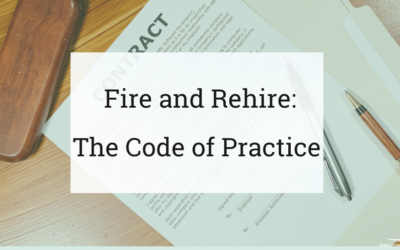Deductions from pay
I want to deduct money from an employee’s pay. Is this possible?
Yes. However, there are many circumstances where you will need employees to express signed consent in order to do so, obviously, you don’t need an agreement to make deductions you are legally obligated to make, for example, PAYE and National Insurance Contributions.
The best way to ensure that you can make deductions from pay is to include a deductions clause in the employment contract – a properly drafted deductions clause should be detailed and comprehensive, listing many of the situations that may give rise to a deduction being made, whether that be due to negligently damaging equipment, breakages, losses due to incorrect orders being processed or even speeding tickets. The clause should include a catch-all line so that any losses are deductible.
The detail that should be included can be comprehensive in order to put your business in the best position when it comes to deductions so it may be worthwhile utilising your free hour with the FRA HR Helpline to get this drafted or reviewed for you.
When can I make deductions?
There is a whole range of reasons to make deductions. Most commonly, because a loss has been suffered due to the actions of an employee or because you have overpaid staff. By way of example, if a member of your team, whether they be working on a deli counter or a member of the waiting on team in a cafe, assumes that they have incorrectly processed an order and caused a loss to the business. You could deduct the loss from the employees wages. Of course, if the error was caused by an issue with a till system or because the customer ordered the wrong item a deduction would not be fair and could not be made.
With a properly drafted deductions clause, an employer in the example above would be able to make deductions.
There is a whole range of possible situations where deductions can be made, most of which could be included in your contracts of employment. Our experience has taught us the wide range of circumstances to include, so please do speak to us if you have any concerns about your deductions clause or your contracts generally.

Can I make deductions from pay for an overpayment of wages or expenses?
The employment rights act specifies that where an overpayment of wages or expenses occurs, a deduction can be made without the need to have the employee’s agreement to deduct.
However, employers still need to be careful.
The tribunals decided that agreement is not required provided that there has been a mistake in fact (for example, an error was made when calculating wages). If there is an error of law – such as where an employer has mistakenly paid an employee for an absence when their was no requirement to do so – then a deduction cannot be made.

When am I unable to make a deduction for wages?
Unless you have a deductions clause it would not be lawful to make a deduction from wages. This general rule does of course exclude the deductions that you are legally required to make.
Those workers who are classed as retail workers have a special set of protections when it comes to deductions. The law defines a retail worker as a person who:
- Carries out the sale or supply of goods; or
- Collects payment in connection with the sale or supply of goods.
This is a simplified version of the definition, but in essence, where an employee is customer-facing and carries out one of the two tasks above you need to exercise some caution. This is a particularly confusing matter where you have employees who do various roles within a business.
Deductions made from a retail worker’s pay for either cash or stock shortages must not exceed 10% of the gross wages payable to the worker on payday. You can consider spreading the deduction over a longer period not only to keep you within the law.
Spreading a deduction is not only useful when it comes to retail workers but is also a great way to reduce the impact deductions can have on your team. Employers should consider whether a deduction would cause financial hardship to the employee, if it will do so they should consider spreading the deduction.
Finally, where you have employees on National Minimum Wage, and where deductions could potentially cause an employee’s wage to fall below that standard, employers need to have caution.
In any of the above circumstances, we’re here to help. Simply call the FRA HR Helpline today.
Do I need to inform my team if I am making a deduction from pay?
Where an employer is considering a deduction from pay it is advisable that an employee is notified as soon as possible, although there is no obligation to inform them of any deduction other than by way of the correct payslip.
Informing an employee in advance will alert them to the fact that you have the right to deduct and will rely upon it, encouraging staff to be more diligent in the future and will deal with any matters relating to financial hardship before they arise.
Employment Law Solutions can help
As part of the Farm Retail Association partnership with Employment Law Solutions, FRA members have access to a free hour per month with Employment Law Solutions. Get in touch to claim your free hour.





